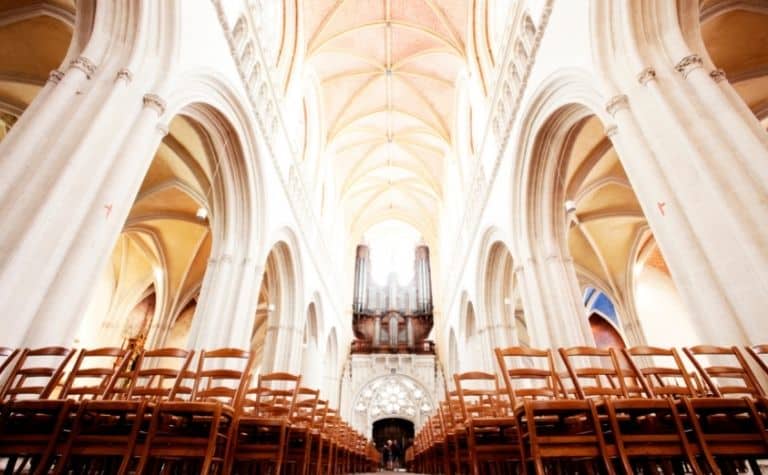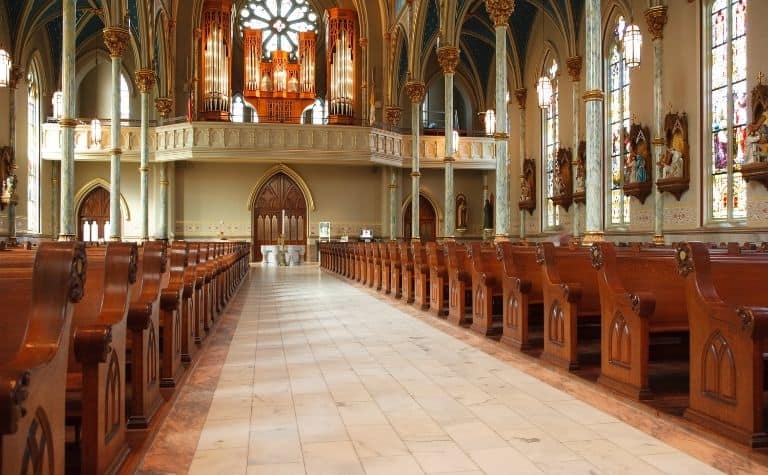The Roman Catholic Church is over 2,000 years old. Non-denominational churches have been one of the fastest-growing segments of Christianity in the Western world over the last 50 years. How do these two traditions compare with one another?
The key differences between Catholic and non-denominational churches include what each believes about the bread and cup at the Lord’s Supper, the value of church tradition in relation to the Bible, and the nature of Mary, mother of Jesus. The majority of non-denominational churches are Protestant.
What is the difference between the origin, membership numbers, and doctrinal emphasis of Catholic and non-denominational churches? Do they believe the same things about God, the Lord’s Supper, the end times, and other doctrines? Keep reading to learn more.
Also, see Catholic, Eastern Orthodox, Protestant: Similarities and Differences to learn more.

Catholicism and Non-Denominational Churches: Comparison
Non-denominational churches are independent of any ministry network or association and have no history with a traditional denomination, like Methodist, Lutheran, Baptist, or Presbyterian
Non-denominational churches sometimes partner with other like-minded churches on service-oriented ministry projects like sheltering the homeless. (Also see the full article What Is a Non-Denominational Church?)
Catholicism is one of the most centralized traditions in Christian history, and the non-denominational church movement is one of the most decentralized.
| Roman Catholicism | Non-Denominational | |
|---|---|---|
| Name | The word “Roman” is derived from the city of Rome, Italy. “Catholic” refers to the universal Church, as opposed to a local church. | “Non-denominational” means a church isn’t formally associated with a historic denomination like Baptist, Lutheran, Presbyterian, Methodist, or any others. |
| Branch of Christianity | Catholicism traces its origins to Christ, and the Apostle Peter (Matt. 16:18-19), who the church teaches, was the first bishop of Rome. | Non-denominational churches are Protestant. The majority are conservative and evangelical. Some are Pentecostal, and some aren’t. Some are Calvinists, and others are Arminians. |
| Founding | The first century | Non-denominational churches have been growing in number since the 2nd half of the 20th century. |
| Membership | The Catholic Church reports a global membership of over 1 billion people. | Millions, but ultimately unknown because there is no central record-keeping system. |
| Doctrinal emphasis | The Pope is the Vicar of Christ; scripture and tradition are authoritative; justification involves forgiveness and sanctification; the sacraments are channels of God’s grace, Mass, and the Eucharist. | Protestant doctrines are paramount. Some may be Pentecostal, others Reformed, and still others Baptist. |
Also, see Catholic vs. Methodist: What’s the Difference? to learn more.

Catholic Beliefs vs. Non-Denominational Church Beliefs
The differences that the Catholic church has with non-denominational churches are generally the same as they have with all Protestant churches. (Also see Can You Be a Christian Without a Denomination?)
| BELIEFS | Roman Catholicism | Non-denominational churches |
|---|---|---|
| God | God is a Trinity. The Father, Son, and Holy Spirit are each fully God. | Non-denominational churches are Trinitarian. |
| Human Leader | The Pope is the Vicar of Christ and the head of the Church on Earth, an office that church teaching traces to the Apostle Peter. | Like other Protestants, non-denominational churches don’t recognize the Pope’s authority or believe that any other human leader is the Vicar of Christ. |
| The Bible | The Catholic Church teaches that the Bible is the inspired Word of God. The Catholic Bible has the same books that Protestant Bibles have but also includes the deutero- canonical literature or Apocrypha. | Non-denominational churches are generally evangelical and conservative. The authority, inspiration, and inerrancy of Scripture are often part of their doctrinal statements. |
| Salvation; Calvinist or Arminian? | Catholic teaching reflects Arminian views, though Jacob Arminius (1560-1609) was Protestant, so the church doesn’t use the same terminology as Arminian Protestants. The Catholic church isn’t Calvinist. | By grace through faith in Christ alone, which reflects Protestant theology; a church may be Calvinist or Arminian |
| Ordinance/ sacraments | Catholic teaching refers to these practices as “ordinances”: adult and infant baptism, confirmation, the Eucharist, penance, anointing, ordination, and marriage. These practices are channels of God’s grace, according to Catholic theology. | Like other Protestants, non-denominational churches refer to these practices as “sacraments.” There are two: baptism and the Lord’s Supper, which aren’t channels of God’s grace. |
| Water Baptism | Sometimes referred to as “paedobaptism” (paedo = “child”), children of Christian parents are baptized to cleanse them of original sin and regenerate them. | Most practice “believer’s baptism,” which describes the conviction that only professing believers should be baptized; infants aren’t baptized, but children can be as soon as they are able to make a genuine profession of faith. |
| Communion | Also called “the Eucharist,” it is a memorial in which the elements become the body and blood of Christ (i.e., “transubstantiation”). | Most non-denominational churches see the elements as a memorial of the death of Christ. |
Also, see Can a Christian Change Denominations or Is It a Sin?
| BELIEFS | Roman Catholicism | Non-denominational churches |
|---|---|---|
| Religious orders | The term describes men (e.g., priests) and women (e.g., nuns) who have fully devoted themselves to a certain form of religious life, which includes poverty, chastity, and obedience. | Non-denominational churches don’t have priests or nuns |
| Saints | Believers who have lived with great virtue and honor may be considered for canonization, which believers living on Earth venerate in part through asking for prayers and blessings. | Non-denominational churches don’t canonize believers who are no longer living on the Earth. They respect and learn from the biographies of believers from previous generations, but they don’t pray to them. |
| Mary | Mary, the mother of Christ, was virgin-born herself, lived a sinless life, reversed Eve’s disobedience, was a perpetual virgin, was raptured to heaven, and is an advocate and co-mediator. | Like other Protestants, non-denominational churches believe Mary is to be respected and lauded for her humility and obedience. However, they don’t teach that she was sinless, is a co-mediator, or was taken bodily to heaven, bypassing physical death. |
| Eschatology | Catholicism holds an Amillennial view of Revelation 20:1-6. | Some are dispensational and premillennial. Those with Reformed theology may be Premillennial (similar to Reformed Baptists) or Amillennial. |

Where Do Non-Denominational Churches Come From?
Historically, people looking to transform perceived errors in doctrine and practice in existing traditions have started Christian denominations, sometimes unintentionally.
- For example, Martin Luther initially sought to reform the Catholic church, not start a denomination called Lutheranism.
- Likewise, John Wesley initially sought to reform the Anglican church, not start the Methodist denomination.
Sometimes people who establish a non-denominational church are displeased in some way with churches affiliated with a traditional denomination.
Some Christians see “denominationalism” as bad and they believe starting a new church that has no historical affiliations is the best option.
Also, see Do All Denominations Go to Heaven?
Please see the related articles below.
References:
[1] Source
[2] Source
[3] Source
Related Questions
Catholic vs. Protestant vs. Orthodox: What's the Difference?
Roman Catholicism, Protestant Christianity, and the Eastern Orthodox Church are the three historical branches of the Christian religion. Each tradition traces its doctrines and practices to the New...
Christianity is an important part of the American story in its various denominational expressions. Some denominations came to America from Europe, while others started on American soil. The size of a...
